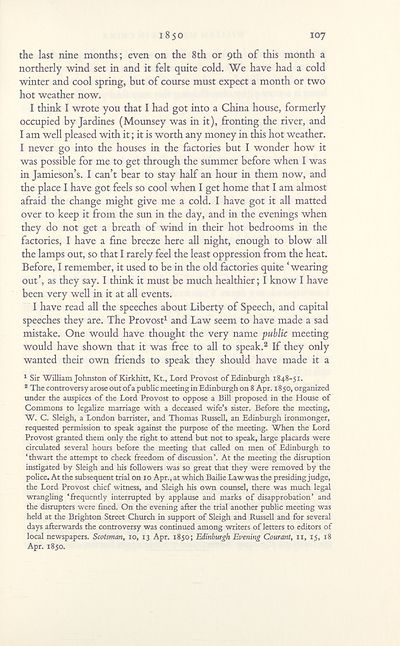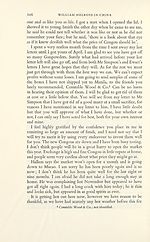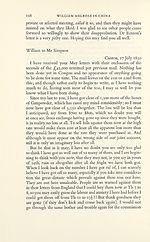Series 4 > William Melrose in China, 1845-1855
(192) Page 107
Download files
Complete book:
Individual page:
Thumbnail gallery: Grid view | List view

1850
107
the last nine months; even on the 8th or 9th of this month a
northerly wind set in and it felt quite cold. We have had a cold
winter and cool spring, but of course must expect a month or two
hot weather now.
I think I wrote you that I had got into a China house, formerly
occupied by Jar dines (Mounsey was in it), fronting the river, and
I am well pleased with it; it is worth any money in this hot weather.
I never go into the houses in the factories but I wonder how it
was possible for me to get through the summer before when I was
in Jamieson’s. I can’t bear to stay half an hour in them now, and
the place I have got feels so cool when I get home that I am almost
afraid the change might give me a cold. I have got it all matted
over to keep it from the sun in the day, and in the evenings when
they do not get a breath of wind in their hot bedrooms in the
factories, I have a fine breeze here all night, enough to blow all
the lamps out, so that I rarely feel the least oppression from the heat.
Before, I remember, it used to be in the old factories quite ‘wearing
out’, as they say. I think it must be much healthier; I know I have
been very well in it at all events.
I have read all the speeches about Liberty of Speech, and capital
speeches they are. The Provost1 and Law seem to have made a sad
mistake. One would have thought the very name public meeting
would have shown that it was free to all to speak.2 If they only
wanted their own friends to speak they should have made it a
1 Sir William Johnston of Kirkhitt, Kt., Lord Provost of Edinburgh 1848-51.
! The controversy arose out ofa public meeting in Edinburgh on 8 Apr. 1850, organized
under the auspices of the Lord Provost to oppose a Bill proposed in the House of
Commons to legalize marriage with a deceased wife’s sister. Before the meeting,
W. C. Sleigh, a London barrister, and Thomas Russell, an Edinburgh ironmonger,
requested permission to speak against the purpose of the meeting. When the Lord
Provost granted them only the right to attend but not to speak, large placards were
circulated several hours before the meeting that called on men of Edinburgh to
‘thwart the attempt to check freedom of discussion’. At the meeting the disruption
instigated by Sleigh and his followers was so great that they were removed by the
police. At the subsequent trial on 10 Apr., at which Bailie Law was the presiding judge,
the Lord Provost chief witness, and Sleigh his own counsel, there was much legal
wrangling ‘frequently interrupted by applause and marks of disapprobation’ and
the disrupters were fined. On the evening after the trial another public meeting was
held at the Brighton Street Church in support of Sleigh and Russell and for several
days afterwards the controversy was continued among writers of letters to editors of
local newspapers. Scotsman, 10, 13 Apr. 1850; Edinburgh Evening Courant, n, 15, 18
Apr. 1850.
107
the last nine months; even on the 8th or 9th of this month a
northerly wind set in and it felt quite cold. We have had a cold
winter and cool spring, but of course must expect a month or two
hot weather now.
I think I wrote you that I had got into a China house, formerly
occupied by Jar dines (Mounsey was in it), fronting the river, and
I am well pleased with it; it is worth any money in this hot weather.
I never go into the houses in the factories but I wonder how it
was possible for me to get through the summer before when I was
in Jamieson’s. I can’t bear to stay half an hour in them now, and
the place I have got feels so cool when I get home that I am almost
afraid the change might give me a cold. I have got it all matted
over to keep it from the sun in the day, and in the evenings when
they do not get a breath of wind in their hot bedrooms in the
factories, I have a fine breeze here all night, enough to blow all
the lamps out, so that I rarely feel the least oppression from the heat.
Before, I remember, it used to be in the old factories quite ‘wearing
out’, as they say. I think it must be much healthier; I know I have
been very well in it at all events.
I have read all the speeches about Liberty of Speech, and capital
speeches they are. The Provost1 and Law seem to have made a sad
mistake. One would have thought the very name public meeting
would have shown that it was free to all to speak.2 If they only
wanted their own friends to speak they should have made it a
1 Sir William Johnston of Kirkhitt, Kt., Lord Provost of Edinburgh 1848-51.
! The controversy arose out ofa public meeting in Edinburgh on 8 Apr. 1850, organized
under the auspices of the Lord Provost to oppose a Bill proposed in the House of
Commons to legalize marriage with a deceased wife’s sister. Before the meeting,
W. C. Sleigh, a London barrister, and Thomas Russell, an Edinburgh ironmonger,
requested permission to speak against the purpose of the meeting. When the Lord
Provost granted them only the right to attend but not to speak, large placards were
circulated several hours before the meeting that called on men of Edinburgh to
‘thwart the attempt to check freedom of discussion’. At the meeting the disruption
instigated by Sleigh and his followers was so great that they were removed by the
police. At the subsequent trial on 10 Apr., at which Bailie Law was the presiding judge,
the Lord Provost chief witness, and Sleigh his own counsel, there was much legal
wrangling ‘frequently interrupted by applause and marks of disapprobation’ and
the disrupters were fined. On the evening after the trial another public meeting was
held at the Brighton Street Church in support of Sleigh and Russell and for several
days afterwards the controversy was continued among writers of letters to editors of
local newspapers. Scotsman, 10, 13 Apr. 1850; Edinburgh Evening Courant, n, 15, 18
Apr. 1850.
Set display mode to:
![]() Universal Viewer |
Universal Viewer | ![]() Mirador |
Large image | Transcription
Mirador |
Large image | Transcription
Images and transcriptions on this page, including medium image downloads, may be used under the Creative Commons Attribution 4.0 International Licence unless otherwise stated. ![]()
| Scottish History Society volumes > Series 4 > William Melrose in China, 1845-1855 > (192) Page 107 |
|---|
| Permanent URL | https://digital.nls.uk/127696881 |
|---|
| Description | Over 180 volumes, published by the Scottish History Society, containing original sources on Scotland's history and people. With a wide range of subjects, the books collectively cover all periods from the 12th to 20th centuries, and reflect changing trends in Scottish history. Sources are accompanied by scholarly interpretation, references and bibliographies. Volumes are usually published annually, and more digitised volumes will be added as they become available. |
|---|


